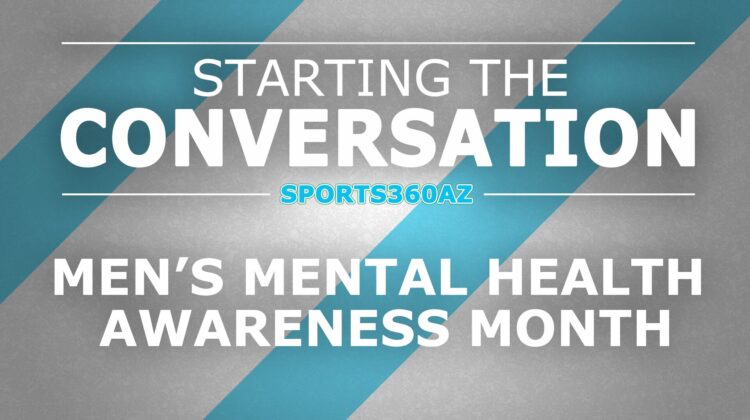Did you know that June is Men’s Mental Health Awareness Month?
It’s starting to be discussed more, but conversation about it needs to increase.
Talking about it is important, whether it’s for all of us living “ordinary” lives or for the athletes we cover, watch, admire, and tear down.
Professional teams are starting to realize the importance of its players mental health, coinciding with physical health. You’ll be seeing more roster moves/injury reports that look like this one below from the Boston Red Sox.
The #RedSox today placed RHP Chris Martin on the 15-Day Injured List, retroactive to June 2, due to anxiety.
To fill his spot on the active roster, the club recalled RHP Zack Kelly from Triple-A Worcester.
— Red Sox (@RedSox) June 5, 2024
There’s nothing wrong with needing time away from your profession to deal with internal issues like anxiety, depression, restlessness and more. We need it in our daily lives, so why can’t athletes have that same luxury? Yes they get paid millions to play a game, but they’re still people like you and I with battles to over come daily.
Kevin Love was at the forefront of this conversation a few years ago, when he battled his own mental health struggles in the NBA.
NBA All-Star Kevin Love has become an outspoken advocate for men’s mental health, especially in the world of sports.
One of Love’s takeaways is, no matter how successful someone appears to be, it can affect someone even at the peak of success.@kevinlove pic.twitter.com/TdXibIWGvq
— HeadsUpGuys (@HeadsUpGuys) April 10, 2024
High schools and colleges have begun recognizing this mental health epidemic in athletes, and are addressing it on many levels.
Did you know?
The second leading cause of death among college athletes is suicide. This quote from the U.S. News & World Report is powerful.
“Athletes are generally thought of as one of the healthiest populations in our society, yet the pressures of school, internal and external performance expectations, time demands, injury, athletic identity and physical fatigue can lead to depression, mental health problems and suicide,” wrote the research team led by Bridget Whelan, a research coordinator with the University of Washington in Seattle.
They looked at all student-athlete deaths from 2002 to 2022, finding that of 1,102 that died, 128 took their own lives. 91 of those 128 were men. The numbers are on the rise each year, according to the researchers in that article.
With the evolving landscape of college athletics due to mostly money (for the schools, conferences, coaches, and athletes), the pressure of being a collegiate athlete has never been higher. Add in the stress caused by overloaded schedules, social media doom scrolling, and daily struggles in relationships and more, and it becomes clear why many become depressed and even suicidal.
Recognizing that is an important first step for coaches, teammates, classmates, administrators, and yes even fans and media members who tend to play a large role in the deterioration of mental health.
What to do about it.
I must clarify this section by saying: I’m not an expert. I care about mental health in my own life and the lives of those I love, work with, and yes cover here at Sports360AZ. I have conversations about this topic with many athletes and trained professionals and there will be weekly posts from me going forward. Sometimes my writing will feel jumbled, but truly it is coming from a place of passion and empathy.
There are many college programs hiring sports psychologists to help develop many sides of the athletes’ mental performance. It’s not just about using mental “hacks” to perform better, but also about laying a foundation to take care of mental health through breathing techniques, meditation, journaling and more.
In my opinion, techniques that teach you to slow down should be taught by parents at home and in our school systems while we grow up. Because everyone could use more skills to improve their mental health.
As men (and women too because the world isn’t black and white), it’s important to realize when we are putting too much on our plate. Society teaches us to do more more more more and guess what… more! But that isn’t how we’re designed.
The same goes for athletes. Youth baseball players, for example, get told to start playing year round at a young age. It’s great to have a passion for the game you love and want to become great at it, but is it really okay to start playing 200+ baseball games a year when you’re ten years old?
Sure that travel ball system will produce guys who go on to the big leagues, but what about the other 99.9% of youth athletes who will never come close to that?
Spread awareness
The point of this article was to show why paying attention to mental health is important. It was also to show how society doesn’t make that a priority, considering many don’t know that June is Men’s Mental Health Awareness Month.
Paying attention to something as big as mental health shouldn’t be limited to a month or a gender, but it does help spread awareness so that’s great.
At the end of the day, please make sure to check in on the people around you. Don’t be afraid to answer “Hey, how are you?” with a truthful answer other than “good.”
And when your favorite team loses because of “one player” or an athlete transfers from your school, think twice before going to social media and bashing them personally. You never know who looks and how it affects them. Criticism is fine, by there is a line to walk.





